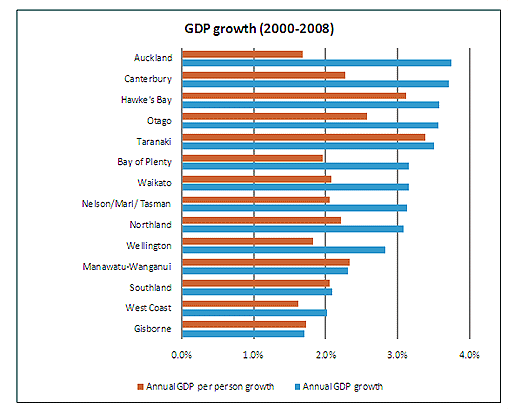Auckland's low GDP per person growth suggests that much of the region's economic growth has merely come from adding more people to the region. This has a familiar ring to it. It parallels New Zealand's growth and productivity woes. As a country we have relied heavily on working more hours each week to increase our output rather than producing more for each hour that we work. Why has Auckland's per capita growth been so much lower than the rest of the country? It is not to do with the type of industries that are located in Auckland. In fact the reverse is true. The industries that have performed well in New Zealand during the boom years are better represented in Auckland than those industries that have performed poorly. The answer possibly lies in the nature of its population growth. Auckland is the first destination for most immigrants arriving in New Zealand and strong net migration has been the biggest contributor to Auckland's population growth this decade. New migrants make an immediate contribution to the economy of their new home through their demand for accommodation and other goods and services. But research suggests that although migrants provide a net boost to economic performance, the gain in GDP per person can be quite small, and even negative for a period as migrants adjust to their new environment. As a result regions in which migrants make up a sizeable portion of population growth may experience lower growth in GDP per person than regions whose populations have grown primarily through natural growth (births exceeding deaths). Research published by Treasury shows that migrants tend to go through an initial adjustment period that can last 5-10 years as they adjust to their new country, work culture and sometimes language. In this period their productivity is below their potential. As an immigrant myself I know how unproductive the first few years in a new country can be. For New Zealand Auckland probably bears the greatest cost of acclimatising new migrants as it is the gateway to New Zealand for many new migrants. After finding their feet in Auckland, many new migrants move to other parts of New Zealand. Auckland has effectively been achieving much of its growth through selling its lifestyle to foreigners. It has lifestyle in buckets and Auckland consistently performs well in international quality of life surveys. In the 2009 Mercer survey it was ranked joint fourth out of 215 cities in 2009, up from fifth in 2008. And immigrant populations can contribute in non-economic ways to reinforce the quality of life, especially through their infusion of culture and cuisine. Is what has happened in Auckland indicative of a fundamental change in the economic model of New Zealand? Historically our wealth has revolved around exploiting our relative abundance in arable land, combined with hard work and smart thinking, to produce exports. Now it seems a major means of expanding wealth is to sell the land directly to migrants. This subtly changes our source of competitive advantage away from the productivity of our land to factors that enhance lifestyles. New Zealand, and Auckland in particular, is an embodiment of the shift to a service based post-industrial society.  ________________ * Infometrics is an economic information and forecasting company based in Wellington. To find out more, see its website here. This piece first appeared in the Dominion Post on June 13, 2009.
________________ * Infometrics is an economic information and forecasting company based in Wellington. To find out more, see its website here. This piece first appeared in the Dominion Post on June 13, 2009.
We welcome your comments below. If you are not already registered, please register to comment
Remember we welcome robust, respectful and insightful debate. We don't welcome abusive or defamatory comments and will de-register those repeatedly making such comments. Our current comment policy is here.